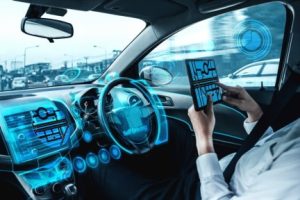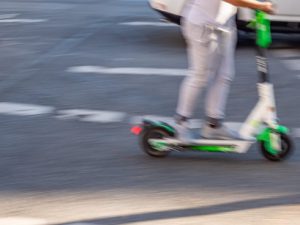Over the next few years we will see a massive increase in the number of self-driving electric vehicles on the road (also known as autonomous vehicles) and with it some headaches for car insurance companies. When you bear in mind we have already seen a significant increase in electric vehicles but nowhere near the same increase in interest from insurance companies, what does the future really hold? There are concerns that having so many parties involved in vehicles of the future could muddy the water when it comes to personal injury claims.
Electric Cars
Electric cars are most certainly the future of transport not only in the UK but also around the world. A report by Next Green Car shows that the number of plug-in cars registered in the UK in July 2017 has increased to 105,000. When you bear in mind that back in 2014 there were on average 500 electric vehicles registered per month this figure has increased to an average of 3300 a month.
The UK government has also announced plans to ban petrol and diesel vehicles by 2040 which will put yet more focus on the electric car industry and other alternative modes of transport.
Autonomous Vehicles
If we look across the pond to the USA we will see a company by the name of Tesla which is leading the electric car market. Initially Tesla started life as a luxury electric vehicle manufacturer but has since moved “down the ladder” towards the mass market recently introducing the Tesla Model 3.
Such has been the interest in electric cars that autonomous vehicles are now available in the US depending on state transport regulations. These vehicles have software built into them which will drive you from point A to point B and also take into account the fastest route, weather, congestion, etc. There is no doubt that autonomous vehicles will one day be commonplace right across the world but at this moment in time there is some concern about their reliability.
Personal Injury Claims
We already know that the most common type of personal injury claim in the UK relates to whiplash and other motoring incidents. The UK government has brought in an array of new regulations to try and combat fraudulent personal injury claims but time will tell whether the fraudsters are still one step ahead.
The introduction of electric vehicles must surely open up an array of issues for insurance companies including personal injury claims hence the reason why it seems many are reluctant to come forward and offer value for money electric car insurance. There are a number of things to take into consideration including:
Damaged Batteries
Battery technology has improved in leaps and bounds over the last decade with significant investment planned well into the future. However, when you bear in mind the power that these electric vehicles can create there must surely be increased potential for injury caused by damaged batteries? Who would be liable for this? Would it be the vehicle owner, battery producer or the vehicle manufacturer?
Faulty Wiring
While the electric vehicle market has been around in some shape or form for more than 100 years it is only since the turn-of-the-century that we have seen a significant increase in electric car numbers. So while there is no doubt that the electric cars of today are manufactured to the highest standards, who would be held liable in the event of faulty wiring causing personal injury? Would it be down to the driver and their obligation to maintain the car in good order? Would it be down to the manufacturer or perhaps the company who serviced the vehicle?
Accidents With Other Vehicles
Even though we know the dangers of accidents involving more than one petrol/ diesel vehicle there is little in the way of history to show us what happens when two electric vehicles collide or one traditional powered vehicle and one electric vehicle.
We have even seen the emergency services openly discussing the challenges of attending accidents involving electric vehicles and the potential delays these may cause. Where there is water and at least one electric vehicle is there a potential knock-on impact to other people in the area? Could this open up yet another avenue for personal injury claims?
Autonomous Travel
Those in favour of electric vehicles believe that autonomous travel will effectively deliver an office on wheels where you can program the vehicle to take you from point A to point B, sit in the back and do your work in comfort. The software is out there, the navigation systems have been available for many years but there have been a number of issues of late.
On 7 May 2016 a Tesla enthusiast by the name of Joshua Brown put his Tesla Model S into “autopilot mode” which literally hands over control of the vehicle during highway driving. Unfortunately, despite the latest in software technology, the autopilot system was unable to differentiate between a white tractor-trailer and the bright sky.
The white tractor-trailer was crossing the highway and in a “perfect situation” the autopilot system would have taken avoiding action but the system was “not aware” the vehicle was there. This resulted in a fatal accident which killed Joshua Brown and put Tesla and its autopilot system under the spotlight.
Slowing Down Development
The death of Joshua Brown will go down as a historic moment in the development of autopilot and autonomous driving systems. The issue is currently under investigation by the federal authorities and we wait with anticipation for their final conclusions. Surely this type of issue could potentially open a company such as Tesla up to enormous personal injury claims actions? Does it also have the potential to become a key tool for the fraudsters looking to create situations whereby they can instigate enormous personal injury claims?
The autopilot system, although much heralded by Tesla, comes with an array of small print one of which demands that there is a driver ready to take over in a split second in the event of a failure of the system or a potential accident. Is this how car manufacturers will cover themselves in the future? Are they giving drivers the keys to groundbreaking systems but protecting themselves from any downside in the event of accidents?
Electronic Monitoring
It will be interesting to see how the electric car manufacturers and the insurance companies work together in the future. Already we have seen the introduction, by Tesla amongst others, of electronic monitoring of all actions within their vehicles. While it is clear, and Tesla has effectively said so, that the accident involving Joshua Brown was a “glitch” with the system there have been other similar claims. Many of these claims have been dismissed because of a system within Tesla vehicles which can be downloaded in the event of an accident to see exactly what happened. Investigators will now be able to confirm how fast the car was going, whether the brakes were used, who was in control and any other issues which may assist in investigations.
Conclusion
While there is no doubt that electronic monitoring systems, such as those installed by Tesla, do have a role to play in reducing personal injury claims going forward, the fraudsters always seem to be one step ahead. The unfortunate death of Joshua Brown may yet result in a multi-million dollar lawsuit against Tesla but time will tell. If the fraudsters get a whiff of significant payouts from the electric vehicle companies because of their autonomous/ autopilot systems they will certainly do their best to make it pay.



